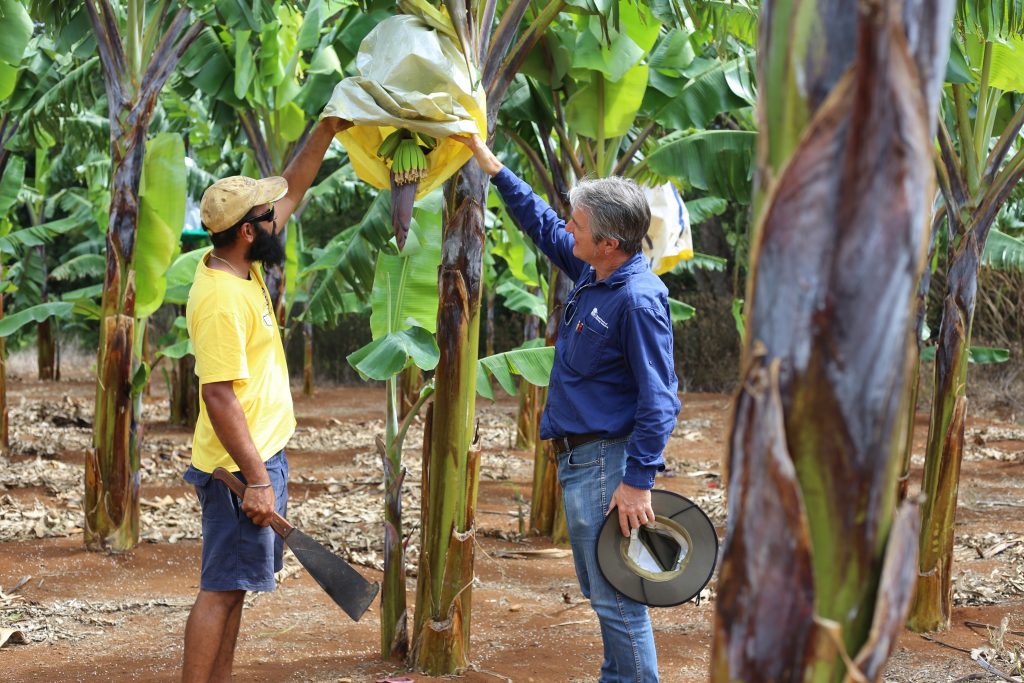
Industry Development Officer Matt Weinert explains how his new extension project will benefit subtropical banana growers.
Matt Weinert wants to rifle through your reject bin. Yes, literally!
Banana Industry Development Officer with the NSW Department of Primary Industries (DPI), Mr Weinert is keen to get a better understanding of why growers are throwing out bananas as part of a new extension project, funded by the Hort Innovation banana fund—BA16007 Subtropical.
Through a reject and downgrade analysis of fruit, Mr Weinert aims to help growers reduce waste and improve the packout of premium fruit.
He said growers don’t always see what’s causing their fruit to be rejected, so he plans to look at bananas in reject bins and qualify the damage.
“Growers make the most money on premium fruit and improving premium packouts is one of the best ways to improve profitability. We will also look at fruit that have been ripened by regional wholesalers to find out if there is anything that is causing that fruit to be out of spec for the retailers,” he said.
This research is just one component of the new project covering the area from Bundaberg in Queensland to Macksville in New South Wales, as well as Carnarvon in Western Australia.
Valerie Shrubb from the Department of Primary Industries and Regional Development in WA and Annie von Blumenstein from the Sweeter Banana Co-operative will undertake the project work in Carnarvon.
Mr Weinert said, “It’s great to have Valerie and Annie involved in the work in Carnarvon, as it means we can cover off the whole Australian subtropical industry.”
“We also want to work with growers in south-east Queensland and Bundaberg as well.
“The second part of the project involves a young growers group similar to the NextGen group in North Queensland, but with subtropical growers. Ultimately we want to link the subtropical and tropical groups as well.
“The idea is just to get growers in the different subtropical producing regions talking to each other and sharing their issues and ideas. A bit like crowdsourcing, often growers are able to solve their own problems when they get together!”
Young growers are already connecting through social media in both the Tweed and Coffs Harbour areas, so Mr Weinert hopes to expand on those existing relationships.
“One thing I really enjoy doing in my job is connecting people and focusing enthusiasm,” he said.
“We want growers to drive it, but the idea would be to get the growers to meet each other, maybe visit packing sheds, even visit other industries. Once the group is operating we want the growers to drive the agenda.”
The project’s final component is a series of workshops, including one on nutrition.
“This would build on the previous workshops on this topic. We’re interested in rolling out some of the project work from the nutrition workshops to be run in North QLD under Reef Trust III funding as well,” said Mr Weinert.
“The idea would be to ask growers to bring leaf and soil analyses along to the workshop so we can work through the results to help them understand the role of the different fertilisers and hopefully help them determine how much to apply and when.”
A workshop focusing on nematodes is also proposed.
“Nematodes are a big issue in the subtropics. As part of the Improved Plant Protection for the Banana Industry project, we recently undertook some nematode soil analyses, with the QDAF nematologists in Brisbane and would like to share the findings at the workshops.”
Email [email protected] for more information on BA16007 Subtropical.
